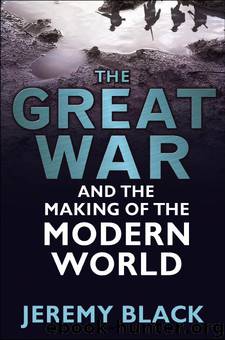Great War and the Making of the Modern World by Black Jeremy

Author:Black, Jeremy
Language: eng
Format: epub
Publisher: Continuum International Publishing
Published: 2010-12-31T16:00:00+00:00
CHAPTER 6
1918
Zero was a magnificent sight as my headquarters was on high ground in rear of the batteries and I could see the flashes from guns and the shrapnel bursts from Valenciennes in the north stretching as far as one could see southwards … the gradual decrease of the Huns’ shell fire told us that our lads were getting on all right.
Colonel Alan Thomson to wife Edith about the attack of the British 4th Division on the Western Front on 1 November 1918.1
There is a certain symmetry to the Second World War that is lacking for the Great War. In the Second, Axis success rose to a peak and then receded, providing a basic narrative for the war, and thus a clear structure for, and prompt to, analysis. Of the major Axis offensives in the latter half of the war, all bar one were, like Kursk in 1943, Leyte Gulf in 1944 and the Bulge in 1944, counter-attacks, and unsuccessful ones at that; the exception, Operation Ichigo, brought much of southern China, a substantial area, under Japanese control in 1944–45, and is invariably underplayed in general histories of the war.
In the Great War, there is no similar pattern. Central Power attacks were very important not only in the initial year of the war, but also in 1915, 1916 and 1917. And so also for 1918. Indeed, in so far as there is the peak referred to above, it occurred in July 1918, with the end of the German attacks on the Western Front, and, in so far as there was a symmetry, it was in 1918 with Central Power strength still apparent in the first half of the year and increasing in Eastern Europe, but subsequently brought low, and to a far greater extent than the earlier successes of the Central Powers.
At the beginning of the year, the strategic situation was propitious for the Germans as a result of the Russian Revolution, but it was unclear how rapidly the Revolution would lead to an end of the war in the East and how quickly the Germans would be able to redirect their military effort elsewhere. There was scant comparable interest in the redeployment of Austrian forces which, indeed, on average, lacked the fighting quality of the Germans and certainly the matériel. In January 1918, Balfour, then British Foreign Secretary, suggested that the Allies help anti-Bolshevik movements in Russia that
might do something to prevent Russia from falling immediately and completely under the control of Germany … while the war continues, a Germanized Russia would provide a source of supply which would go far to neutralize the effects of the Allied blockade. When the war is over, a Germanized Russia would be a peril to the World.2
Lenin wanted the spread of Communism, not the Germanization of Russia, but, in Allied eyes, his desire for peace amounted to, and led towards, the latter. He had hoped that the spread of revolution would affect Germany and make negotiations unnecessary, but, instead, the Germans drove the pace of negotiation.
Download
This site does not store any files on its server. We only index and link to content provided by other sites. Please contact the content providers to delete copyright contents if any and email us, we'll remove relevant links or contents immediately.
| Automotive | Engineering |
| Transportation |
Whiskies Galore by Ian Buxton(41995)
Introduction to Aircraft Design (Cambridge Aerospace Series) by John P. Fielding(33122)
Small Unmanned Fixed-wing Aircraft Design by Andrew J. Keane Andras Sobester James P. Scanlan & András Sóbester & James P. Scanlan(32796)
Craft Beer for the Homebrewer by Michael Agnew(18237)
Turbulence by E. J. Noyes(8040)
The Complete Stick Figure Physics Tutorials by Allen Sarah(7366)
The Thirst by Nesbo Jo(6932)
Kaplan MCAT General Chemistry Review by Kaplan(6929)
Bad Blood by John Carreyrou(6612)
Modelling of Convective Heat and Mass Transfer in Rotating Flows by Igor V. Shevchuk(6433)
Learning SQL by Alan Beaulieu(6282)
Weapons of Math Destruction by Cathy O'Neil(6267)
Man-made Catastrophes and Risk Information Concealment by Dmitry Chernov & Didier Sornette(6007)
Digital Minimalism by Cal Newport;(5750)
Life 3.0: Being Human in the Age of Artificial Intelligence by Tegmark Max(5549)
iGen by Jean M. Twenge(5409)
Secrets of Antigravity Propulsion: Tesla, UFOs, and Classified Aerospace Technology by Ph.D. Paul A. Laviolette(5369)
Design of Trajectory Optimization Approach for Space Maneuver Vehicle Skip Entry Problems by Runqi Chai & Al Savvaris & Antonios Tsourdos & Senchun Chai(5066)
Pale Blue Dot by Carl Sagan(4996)
